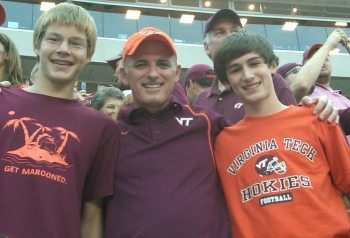
We’ve all seen it happen. Two previously unacquainted individuals meet each other and instantly bond over their shared connections — their combination of similar networks, colleagues or interests.
Phrases such as “it’s a small world, isn’t it?” are exchanged, hands are shaken and business cards are swapped. It’s how the world works. But are all connections created equal?
WashingtonExec recently interviewed area executives about the topic and discovered that one college network in particular stood out among its counterparts in terms of its robusticity in the federal IT sphere: the Virginia Polytechnic Institute and State University (Virginia Tech) “Hokie” network.
An array of area universities maintain a pipeline into the government contracting and government industries, but Virginia Tech’s has distinguished itself in its prominence in the federal IT arena for many reasons, according to its alumni.
The public land-grant and sea-grant research university founded in 1872 offers more degrees and enrolls more full-time students than any other school in the state.
Tim Chase, a Tech legacy and Principal for Deloitte Consulting LLP who sits on the Virginia Tech MBA Advisory Board, described alumni as individuals who cherish their allegiance to the school.
“Maybe more than any school I know, Virginia Tech graduates seem to put their VT experience high on the list of what defines them, and there’s a resulting tendency to seek fellow graduates out,” Chase said. “The motivations to connect in the federal IT marketplace are different – it’s a fast-moving industry in every dimension and the quality of your network can significantly impact your career.”
Deloitte maintains special interest communities for a variety of networks, many of which are alumni groups.
The Virginia Tech community includes more than 400 individuals, which Chase said makes it one of the largest at the firm.
But other key players in the industry had different hypotheses to explain Virginia Tech’s prominence in the federal IT sphere.

Brian Karlisch, the CEO of Buchanan & Edwards, met his wife while attending the Blacksburg college. His company has partnered with a Virginia Tech group that specializes in cyber-related research; Buchanan & Edwards then introduces the research to its customers.
Moreover, the school has a tendency to pull heavily from the Northern Virginia area, which, Karlisch said, means many graduates come from families who are connected to the federal government in some way — be it with a military or diplomacy or government employee background.
“Virginia Tech’s history as a land grant institution with the traditions of the corp of cadets serves to strengthen this tie to the mission of the federal government,” Karlisch said, describing many students’ longstanding connections in the federal market space. “Students’ experiences at Virginia Tech build a sense of duty for our country and fellow citizens. Once you are introduced to a Virginia Tech grad, you already have a sense of their character, work ethic, and values, which makes it easy to instantly connect with other Tech alums.”
It’s also hard to dismiss the fact that the school is a technology-oriented university devoted to the instruction of applied sciences and technical arts, which pretty much predetermines a percentage of its alumni to a career in the federal IT sector.
Simone Acha, the vice president of Enterprise Solution Technologies at ECS Federal Inc., said the university’s research and education presence in the Northern Virginia area has contributed to the volume of alumni in the greater Washington,D.C. area federal IT space.
“I think the vocal part in Federal IT just comes from our ‘Hokie style,” Acha said. “We are taught a practical education – applying the education we receive to solve real world problems.
Mary Davie, the Assistant Commissioner of integrated technology services at the General Services Administration, agreed, and suggested the prominence of formal and informal networks in the greater Washington, D.C. area also facilitates networking among Hokies wishing to connect with past colleagues.
“It seems to me that Hokies in general are just “really good people” so it’s easy to connect with other Hokies and we seem to have a network based on relationships and trust,” Davie said.
Acha, like many local alumni, has participated in projects like VT SERGE and VT IDEA, which are local networks that aim to enhance Virginia Tech’s research profile in the DC-metro area.
The first, VT SERGE (Science and Engineering Region Growth Enterprise), is comprised of senior level executives who meet with Virginia Tech officials to link the school with research opportunities in the IT companies.
VT IDEA, or Intelligence and Defense Executive Alumni, is a group of government and industry executives who hold positions related to intelligence and national security. The network aims to establish contacts within the security agencies for Tech programs and faculty.
“Having also been a founding partner in a small Federal IT business, it was important to team up and join forces when pursuing some of the Federal IT opportunities with these other small firms, sometimes taking the lead, and sometimes providing a strong supporting role on the bid for work,” Acha said of her involvement with VT IDEA and VT SERGE. “I have just been so impressed with the number of quality small IT firms that I met and have gotten to know and partner with and I am proud to say they are founded by Hokies.”

Kristina Kelly, an account manager at 1901 Group, graduated in 2012 from Virginia Tech and has already begun to notice the network’s robusticity in the federal IT arena.
“I graduated Virginia Tech a year ago and my network of Virginia Tech alumni has grown significantly since working with the federal government,” Kelly said, noting she anticipates continuing to make use of the network. “I believe that I will be able to find new businesses, partnering opportunities as well as benefit from the experience of my mentors.”
Hokies agree across the board on one thing especially though — they all bleed maroon and orange, and they’ll talk your ear off about it.
Mark Weber, the president of the US public sector portion of NetApp, explained the Hokie phenomenon and how it facilitates networking among alumni.
“Networking with Hokies is easy because they wear it on their sleeves, often literally by sporting an orange and maroon shirt or displaying a license plate to proclaim their Hokie spirit,” Weber said. “This passion can’t help but spill over into other aspects of their lives.”
Kay Curling, the Chief Human Resources Officer (CHRO) at Salient Federal Solutions, Inc, has a connection to the university which also spills into her personal life — through legacy. Her family tree has, metaphorically speaking, orange and maroon leaves.
“We are three generations of Hokies – Father-in-law, husband, me and our eldest daughter,” Curling said. “As we eagerly anticipate the birth of our first grandchild, we are already preparing to build a college fund for him to attend VT! Hokie baby gear a plenty!”
Mobilegov President and Founder Tom Suder explains the Hokie pride phenomenon as something which is bred in its students.
“Virginia Tech has always had an underdog mentality. In the 70s and 80s and most of the 90s, the mainstream press and most of the country regarded Tech as somewhat of a backwater, agricultural school,” Tom Suder said. “After going to Tech, you realize how great it is and that it should be regarded as one of the best schools in the country. You carry that pride with you.”


